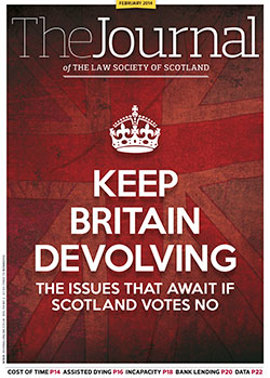Pension policy - a vote winner?

The upcoming Scottish referendum and UK general election seem set to trigger yet further discussion and initiatives on pensions policy. The uncertainty caused and the thrust of many of the proposals seem somewhat inconsistent with encouraging long-term financial planning by employers and individuals.
The Scottish Government set out its proposals in its paper Pensions in an Independent Scotland (September 2013).
The paper states that its main aim is to provide clarity and reassurance for existing pensioners, people of working age, employers and the pensions industry. With that in mind, three key principles are outlined as underpinning the Scottish pensions system under independence:
To keep the best of the existing state pensions system, including genuine improvements where necessary.
To provide strong protection for individuals’ private pensions savings via an effective regulatory system.
To deliver a public service pensions system that is affordable, sustainable and fair.
Promises, and issues
While those principles are not controversial, they broadly translate in terms of the proposals and commitments made in the paper to a continuation of the status quo, or marginal improvements (or a suggestion that these might arise in future on independence). While limited detail is included in the paper on independence, various commitments are made, including:
To update the basic state pension and the guarantee credit element of pension credit by the “triple lock” from 2016 for the first term of an independent parliament. The triple lock system was introduced in 2010 and provides for protection of benefits over time, increasing them by average earnings, CPI inflation, or 2.5%, whichever is the highest.
That the Scottish single-tier pension will at least match the rest of the UK rate for single-tier pension. This is in the context of the creation of a separate Scottish state pension system.
To establish an Independent Commission on the State Pension Age, tasked with considering the appropriate rate of increase of the state pension age for Scotland.
To continue with the rollout of auto-enrolment.
To continue the current body of law applying to pensions until amended, replaced or repeated by the Scottish Parliament.
A Scottish Pensions Regulator is also proposed, to work closely with the UK Pensions Regulator and the FCA. While the paper on independence highlights many difficult issues that will require to be addressed in the event of a Yes vote, little detail is given as to how those will be tackled. The resulting uncertainty and possibility for change is not conducive to stakeholders having confidence in making long-term pension plans.
UK campaign
In the wider UK context since the new year, it seems we have already entered a lengthy campaign period in the run-up to the UK general election in May 2015. The tie-in coalition deal and its commitment until the election in May 2015 seems certain to prompt more focus on the manifestos of the leading political parties.
Given studies that show that those receiving or interested in a pension are more likely to vote, pensions point-scoring is already making the front pages.
Labour have waded in to challenge insurers over changes to pension schemes in the private sector; the Conservatives are laying claim to the biggest cash rise in the state pension and a commitment to the triple lock in relation to that until 2020; and the Liberal Democrats are championing yet a further reduction to the lifetime allowance of £1.25 million to £1 million (notwithstanding that it is being reduced from £1.5 million to £1.25 million with effect from 6 April 2014).
Doubtless, further proposals for change will emerge in the coming months, designed to reassure and sway voters. This politicising of pensions policy and what seems like continual change is most unhelpful, and undermining of what fragile confidence is left in the pensions system. Roll on June 2015.
In this issue
- Cold case examination of early childhood evidence
- Incentivising employee ownership
- The diversity imperative
- Towards a more inclusive democracy
- Journal magazine Index 2013
- Reading for pleasure
- Opinion: Campbell Read
- Book reviews
- Profile
- President's column
- RoS's services for solicitors
- Issues for the Union
- Critical mass
- Is this where it ends?
- Testing capacity
- Making plans for auto-enrolment
- Loosening the purse strings
- Data: don't be caught out
- Punished enough?
- Prior statements practice
- Family business musings
- TUPE: armour not gold-plated?
- Pension policy - a vote winner?
- Scottish Solicitors' Discipline Tribunal
- In with the system
- Check and double-check
- Lender Exchange ahead
- Have you the capital?
- How not to win business: a guide for professionals
- Reflections from the Complaints Commission
- Ask Ash
- Danger spots
- It's the name of the game
- Law reform roundup
- Conference aspires to judicial diversity






